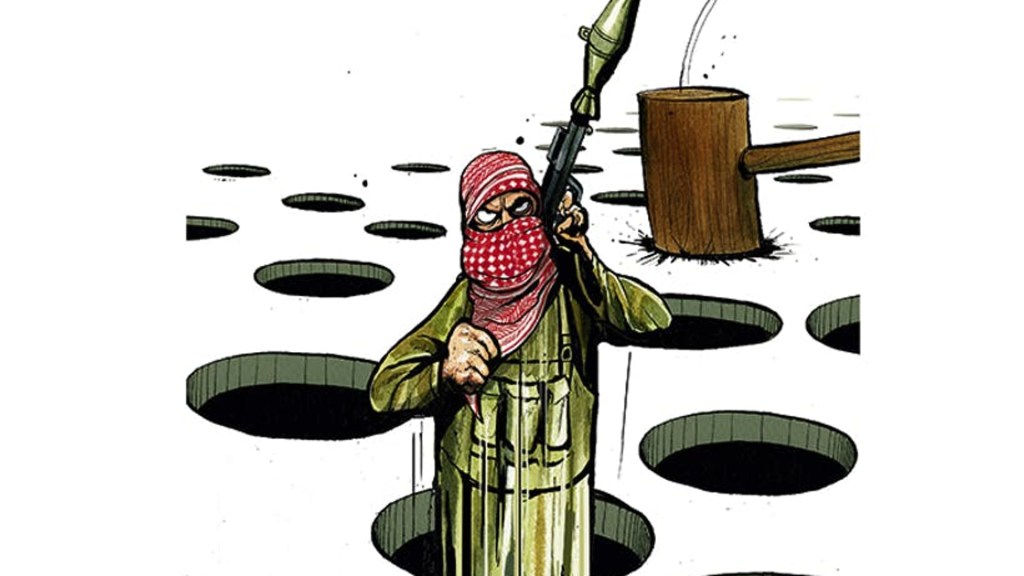As coronavirus swept the globe a year ago, Isis began issuing pronouncements. ‘God, by his will, sent a punishment to the tyrants of this time and their followers,’ said one such; ‘we are pleased about this punishment from God for you.’ With the world on lockdown, Isis followers were urged not to sit around at home but to ‘raid the places’ of the enemies of God. ‘Don’t let a single day pass without making their lives awful.’
The virus might have begun as God’s punishment to China for persecuting the Uighurs but, as one Isis video put it, the pandemic was a chance to attack Americans, Europeans, Australians and Canadians. For a moment, the jihadis toyed with the idea of sending infected volunteers to sicken the enemy. But they dropped that, telling their followers to use the reliable methods for which Isis is known. ‘Plan your perfect killing spree…coldly kill them… stab them, shoot them.’
Isis anticipated economic collapse, chaos and anarchy in the West. ‘The last thing they want during these trying times is for the caliphate soldiers to hit them like before in Paris, London and Brussels.’ Isis apparently did not intend to send martyrs from the Middle East as this would break sharia rules to quarantine and ‘flee from sick persons like one would flee a lion’. Instead, attacks from jihadis within would catch the crusader nations by surprise, Isis said — even though they had announced the plan in their weekly newsletter. A military triumph was inevitable, just as when Muhammad swept all before him.
This was the usual Isis guff: pompous rhetoric and wild predictions out of all proportion to reality. So far, fortunately, there has been no Isis offensive taking advantage of the West’s weakness in time of plague. Perhaps intelligence and security services stopped the attacks. Maybe the volunteers who returned home after the fall of the old Isis caliphate found they quite liked the quiet life. Or it could be that we will still see an outbreak once western lockdowns end. Regardless, the newsletter was right about one thing. When the crusaders had to ‘allocate massive resources’ to fight the pandemic, they took their eyes off Syria and Iraq. In those places, Isis is back.
The monthly total of Islamic State attacks in Syria and Iraq jumped dramatically in April 2020 and has stayed high ever since. Last year there were nearly 600 attacks in Syria and more than 1,400 in Iraq. These are figures from Isis itself, but they don’t seem to be exaggerated. In January, for instance, reports said there were 100 attacks in north-eastern Syria alone: beheadings, suicide bombings, assassinations and kidnappings. The attacks are getting bigger and more sophisticated. In December an Isis ambush killed 40 people on a Syrian military bus in the Syrian province of Deir Azour. In Baghdad, 32 people were killed when two Isis suicide bombers blew themselves up in a crowded clothes market.
The Caliphate with a capital C – the state and territory run by Isis — has not returned; Isis doesn’t appear to be a single, coherent organization but a name brand, a franchise of some 10,000 loyalists scattered across the deserts of northeastern Syria and western Iraq. Still, at night, in the villages, Isis is in charge and people are afraid. When two shopkeepers in a Deir Azour village refused to pay protection money recently, I was told, their severed heads were left in the street outside their shops. This kind of thing happens regularly.
Operation Inherent Resolve (OIR), still described as an 83-member coalition to defeat Daesh, continues its work under American leadership. The OIR spokesman, Col. Wayne Marotto, tweeted that there had been more than 70 February operations against Isis, ‘preventing 90 terrorists from committing acts of terror’. But Isis’s weakness is now its strength: there’s no territory to take, no capital to flatten, just ‘pockets of resistance’. At the end of January, OIR announced that an airstrike had killed Abu Yasir, the Isis leader in Iraq — a pleasing victory for the coalition, though of course Abu Yasir will be replaced.
And that is the problem. There is a seemingly inexhaustible supply of angry young Sunnis ready to swear baya’a — allegiance — to Isis. We are back to the familiar argument that Isis will be extinguished only with a political settlement that wins over disaffected Sunnis. A European diplomat told me that the solution will require a ‘grand bargain’ between Arabs and Kurds to divide up international aid. But a senior American official says the few tens of millions of dollars in the current US aid budget aren’t nearly enough to stabilize the Sunni lands where Isis recruits — half a billion is needed just to get things started. He pointed to al-Hol detention camp, ‘the final remnant of the Caliphate’ where 65,000 Isis family members are being held. They have to be freed eventually, and without jobs and a future, the children of al-Hol will become the next generation of jihadis.
It is true that there will be no more Isis in Syria and Iraq when Sunnis no longer wish to join it. But 20 years of nation-building in Iraq (and in Afghanistan too) have failed to achieve the peace and prosperity that might be an alternative to jihad. What is to be done? Isis calls the pandemic a ‘divine punishment of arrogance and unbelief’. That might better describe the decision to invade Iraq and Afghanistan and remake them in our image. The futility of that effort is inescapable. An understandable reaction would be simply to walk away, and during the US presidential campaign Joe Biden repeatedly promised to end the ‘forever wars’. But as president, Biden is returning to the old policy of containment and disruption, with a small US military presence on the ground. Isis, or some version of it, will be always with us, just like the virus. And so will the forever wars.
This article was originally published in The Spectator’s April 2021 US edition.


















